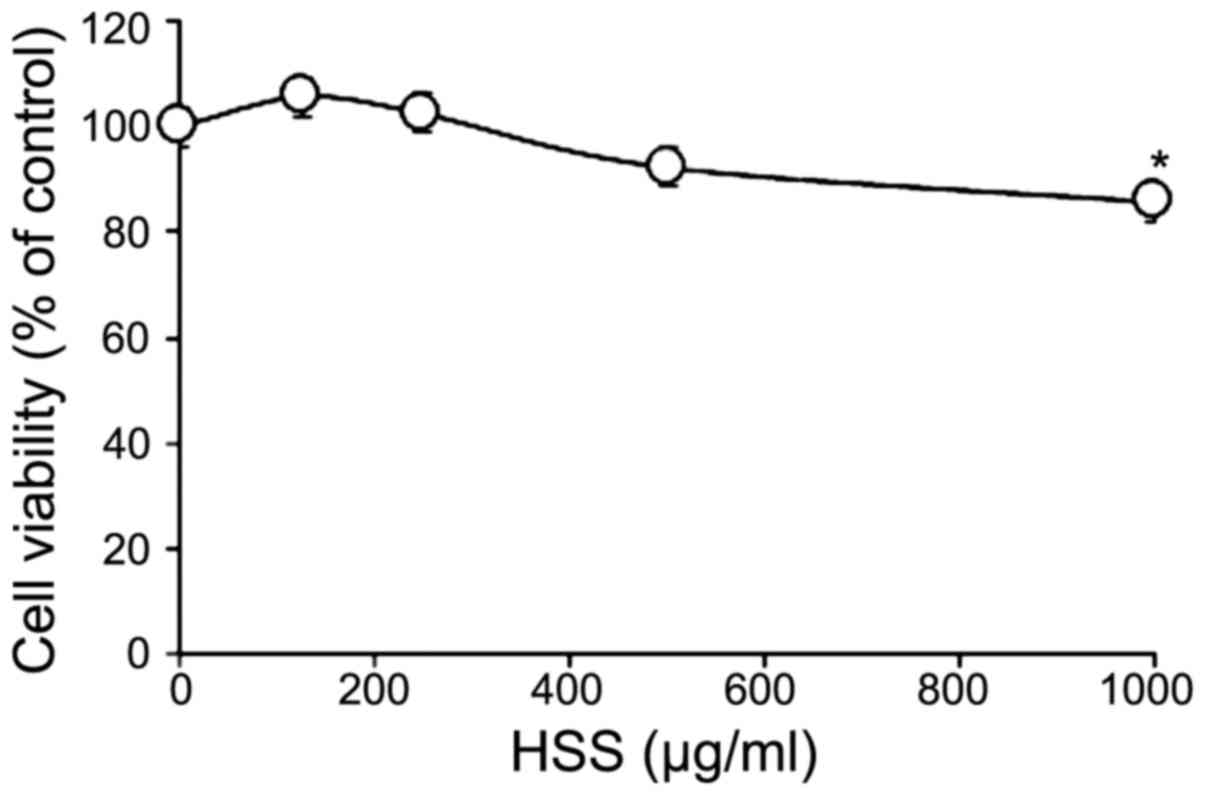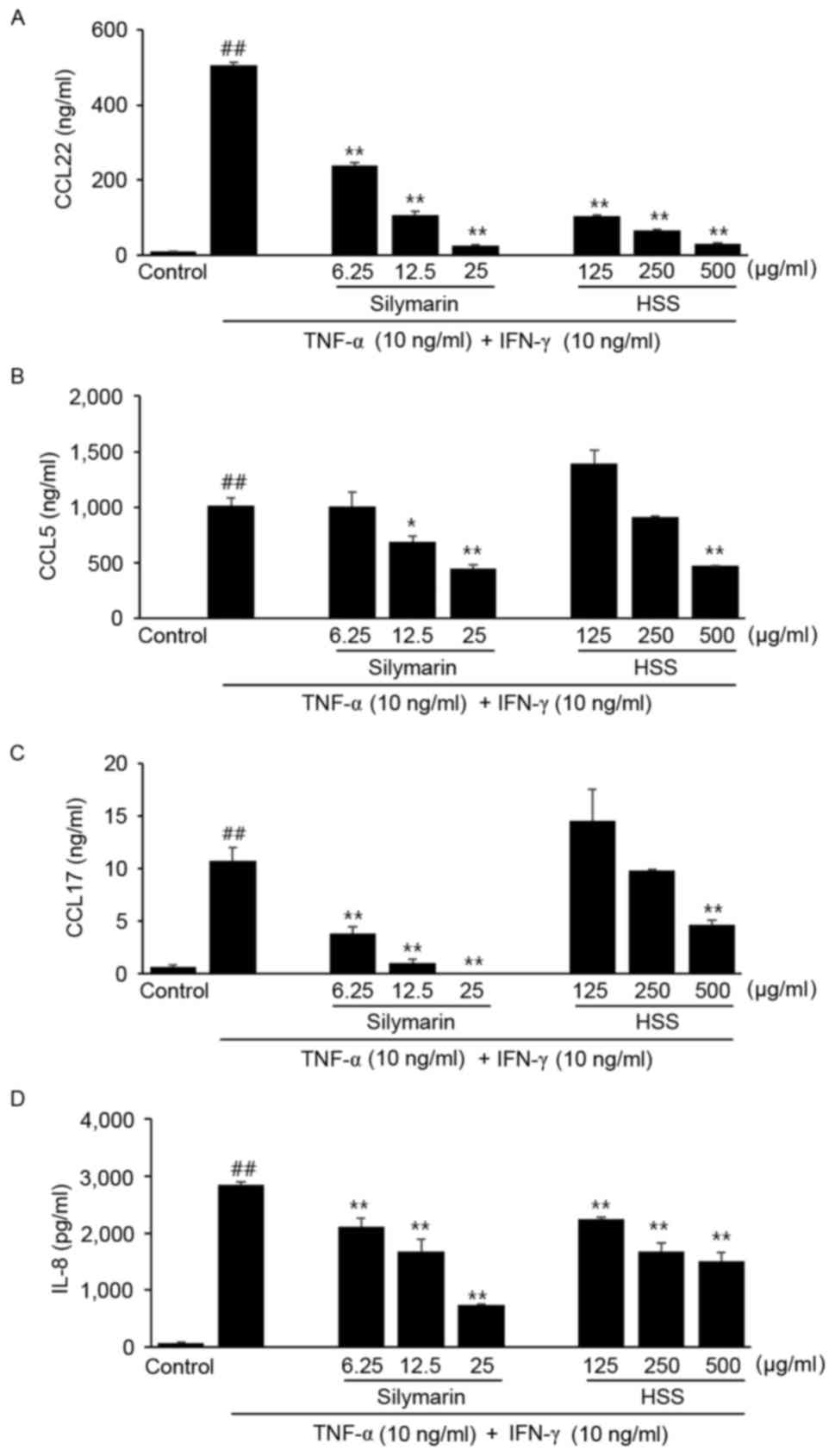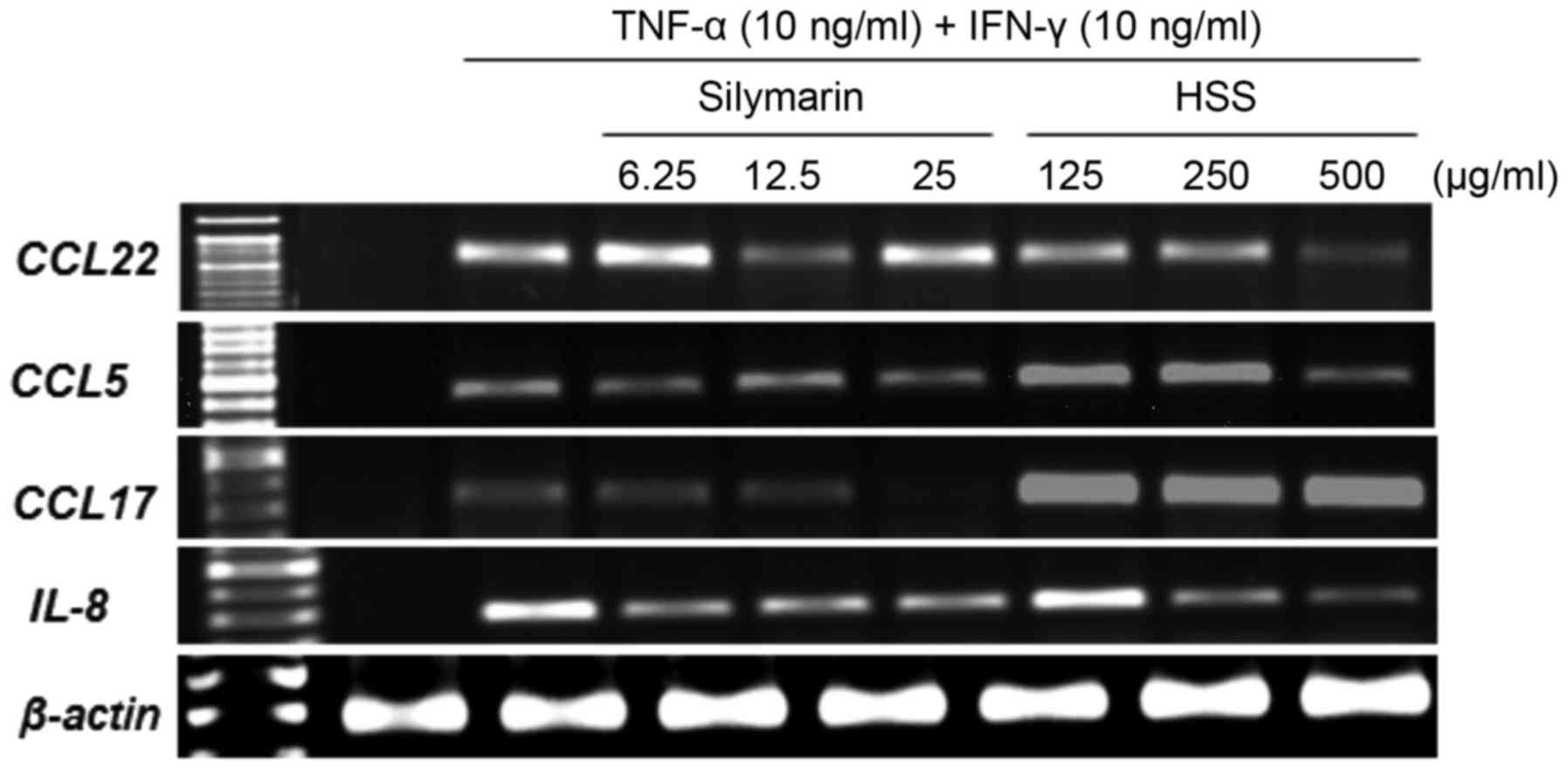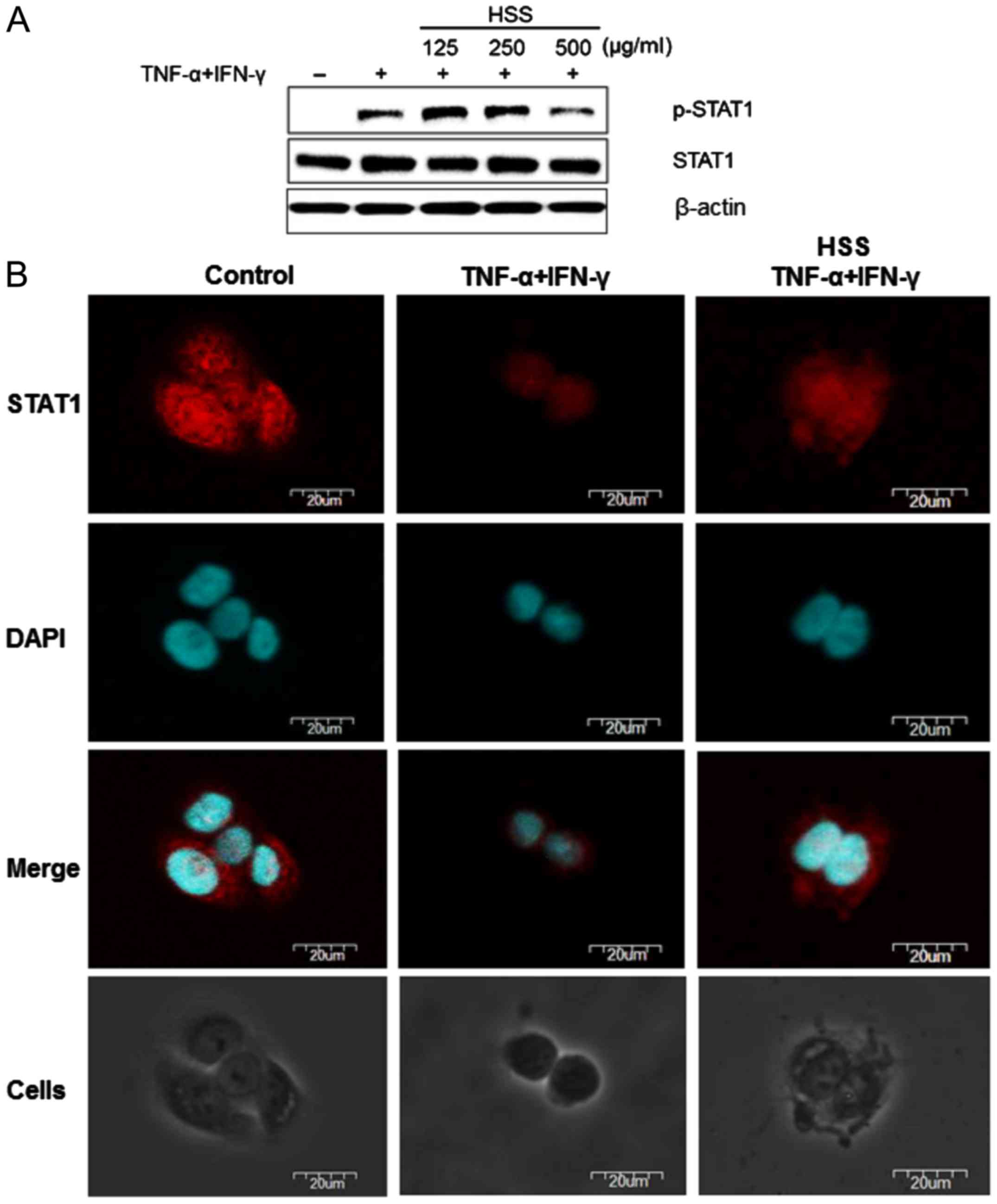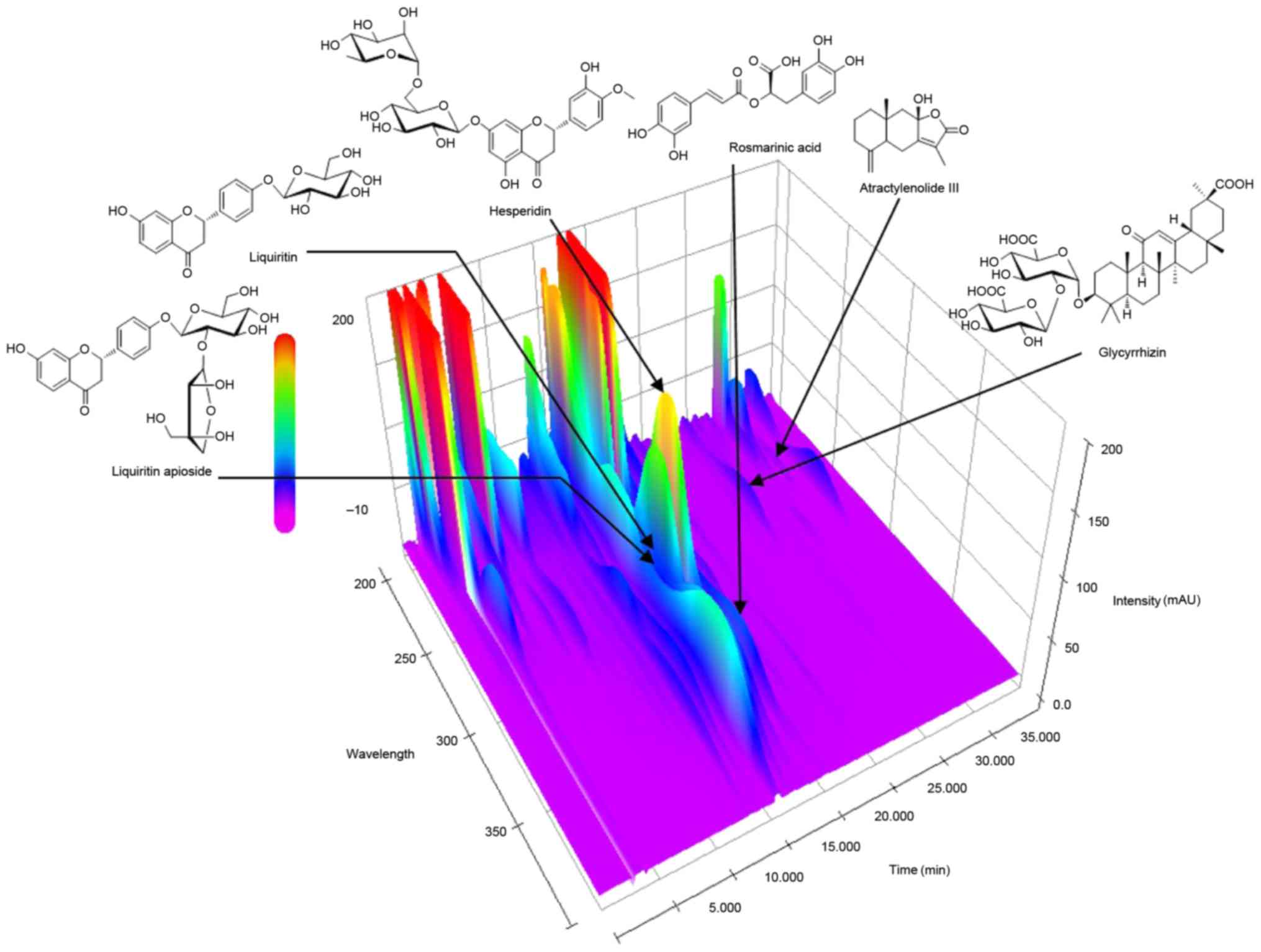|
1
|
Dai X, Sayama K, Tohyama M, Shirakata Y,
Hanakawa Y, Tokumaru S, Yang L, Hirakawa S and Hashimoto K: Mite
allergens is a danger signal for the skin via activation of
inflammasome in keratinocytes. J Allergy Clin Immunol. 127:806–814.
2011. View Article : Google Scholar : PubMed/NCBI
|
|
2
|
Chio JK, Oh HM, Lee S, Kwon TK, Shin TY,
Rho MC and Kim SH: Salvia plebeia suppresses atopic dermatitis-like
skin lesions. Am J Chin Med. 42:967–985. 2014. View Article : Google Scholar : PubMed/NCBI
|
|
3
|
Hay RJ, Johns NE, Williams HC, Bolliger
IW, Dellavalle RP, Margolis DJ, Marks R, Naldi L, Weinstock MA,
Wulf SK, et al: The global burden of skin disease in 2010: An
analysis of the prevalence and impact of skin conditions. J Invest
Dermatol. 134:1527–1534. 2014. View Article : Google Scholar : PubMed/NCBI
|
|
4
|
Meagher LJ, Wines NY and Cooper AJ: Atopic
dermatitis: Review of immunopathogenesis and advances in
immunosuppressive therapy. Australas J Dermatol. 43:247–254. 2002.
View Article : Google Scholar : PubMed/NCBI
|
|
5
|
Werfel T: The role of leukocytes,
keratinocytes, and allergen-specific IgE in the development of
atopic dermatitis. J Invest Dermatol. 129:1878–1891. 2009.
View Article : Google Scholar : PubMed/NCBI
|
|
6
|
Kakinuma T, Nakamura K, Wakugawa M, Mitsui
H, Tada Y, Saeki H, Torii H, Komine M, Asahina A and Tamaki K:
Serum macrophage-derived chemokine (MDC) levels are closely related
with the disease activity of atopic dermatitis. Clin Exp Immunol.
127:270–273. 2002. View Article : Google Scholar : PubMed/NCBI
|
|
7
|
Shimada Y, Takehara K and Sato S: Both Th2
and Th1 chemokines (TARC/CCL17, MDC/CCL22, and Mig/CXCL9) are
elevated in sera from patients with atopic dermatitis. J Dermatol
Sci. 34:201–208. 2004. View Article : Google Scholar : PubMed/NCBI
|
|
8
|
Oshio T, Sasaki Y, Funakoshi-Tago M,
Aizu-Yokota E, Sonoda Y, Matsuoka H and Kasahara T:
Dermatophagoides farinae extract induces severe atopic dermatitis
in NC/Nga mice, which is effectively suppressed by the
administration of tacrolimus ointment. Int Immunopharmacol.
9:403–411. 2009. View Article : Google Scholar : PubMed/NCBI
|
|
9
|
Casas C, Ribet V, Alvarez-Georges S,
Sibaud V, Guerrero D, Schmitt AM and Redoulès D: Modulation of
interleukin-8 and staphylococcal flora by Avène hydrotherapy in
patients suffering from chronic inflammatory dermatoses. J Eur Acad
Dermatol Venereol. 25 Suppl 1:S19–S23. 2011. View Article : Google Scholar
|
|
10
|
Tüzün Y, Antonov M, Dolar N and Wolf R:
Keratinocyte cytokine and chemokine receptors. Dermatol Clin.
25:467–476. 2007. View Article : Google Scholar : PubMed/NCBI
|
|
11
|
He C, Medley SC, Hu T, Hinsdale ME, Lupu
F, Virmani R and Olson LE: PDGFRβ signalling regulates local
inflammation and synergizes with hypercholesterolaemia to promote
atherosclerosis. Nat Commun. 6:77702015. View Article : Google Scholar : PubMed/NCBI
|
|
12
|
Madonna S, Scarponi C, De Pità O and
Albanesi C: Suppressor of cytokine signaling 1 inhibits IFN-gamma
inflammatory signaling in human keratinocytes by sustaining ERK1/2
activation. FASEB J. 22:3287–3297. 2008. View Article : Google Scholar : PubMed/NCBI
|
|
13
|
McAleer MA, Flohr C and Irvine AD:
Management of difficult and severe eczema in childhood. BMJ.
345:e47702012. View Article : Google Scholar : PubMed/NCBI
|
|
14
|
Park BK, Park YC, Jung IC, Kim SH, Choi
JJ, Do M, Kim SY and Jin M: Gamisasangjatang suppresses pruritus
and atopic skin inflammation in the NC/Nga murine model of atopic
dermatitis. J Ethnopharmacol. 165:54–60. 2015. View Article : Google Scholar : PubMed/NCBI
|
|
15
|
Tsai TC, Tung YT, Kuo YH, Liao JW, Tsai
HC, Chong KY, Chen HL and Chen CM: Anti-inflammatory effects of
Antrodia camphorata, a herbal medicine, in a mouse skin ischemia
model. J Ethnopharmacol. 159:113–121. 2015. View Article : Google Scholar : PubMed/NCBI
|
|
16
|
Jeong SJ, Lim HS, Seo CS, Jin SE, Yoo SR,
Lee N and Shin HK: Anti-inflammatory actions of herbal formula
Gyejibokryeong-hwan regulated by inhibiting chemokine production
and STAT1 activation in HaCaT cells. Biol Pharm Bull. 38:425–434.
2015. View Article : Google Scholar : PubMed/NCBI
|
|
17
|
Jeong SJ, Lim HS, Seo CS, Kim JH, Jin SE,
Yoo SR and Shin HK: Traditional herbal formula Jakyakgamchotang
(Paeonia lactiflora and Glycyrrhiza uralensis) impairs inflammatory
chemokine production by inhibiting activation of STAT1 and NF-κB in
HaCaT cells. Phytomedicine. 22:326–332. 2015. View Article : Google Scholar : PubMed/NCBI
|
|
18
|
Lim HS, Yeji K, Seo CS, Yoo SR, Jin SE,
Shin HK and Jeong SJ: Chungsimyeonja-eum inhibits inflammatory
responses in RAW 264.7 macrophages and HaCaT keratinocytes. BMC
Complement Altern Med. 15:3712015. View Article : Google Scholar : PubMed/NCBI
|
|
19
|
Song BK, Won JH and Kim S: Historical
Medical Value of Donguibogam. J Pharmacopuncture. 19:16–20. 2016.
View Article : Google Scholar : PubMed/NCBI
|
|
20
|
Ito N, Nagai T, Yabe T, Nunome S, Hanawa T
and Yamada H: Antidepressant-like activity of a Kampo (Japanese
herbal) medicine, Koso-san (Xiang-Su-San), and its mode of action
via the hypothalamic-pituitary-adrenal axis. Phytomedicine.
13:658–667. 2006. View Article : Google Scholar : PubMed/NCBI
|
|
21
|
Hori A, Ito N, Oikawa T and Hanawa T:
Kososan, but not milnacipran, elicits antidepressant-like effects
in a novel psychological stress-induced mouse model of depression.
Trad Kampo Med. 2:1–7. 2015. View Article : Google Scholar
|
|
22
|
Kang JS, Yoon WK, Han MH, Lee H, Lee CW,
Lee KH, Han SB, Lee K, Yang KH, Park SK and Kim HM: Inhibition of
atopic dermatitis by topical application of silymarin in NC/Nga
mice. Int Immunopharmacol. 8:1475–1480. 2008. View Article : Google Scholar : PubMed/NCBI
|
|
23
|
Kang NJ, Koo DH, Kang GJ, Han SC, Lee BW,
Koh YS, Hyun JW, Lee NH, Ko MH, Kang HK and Yoo ES: Dieckol, a
component of Ecklonia cava, suppresses the production of MDC/CCL22
via down-regulating STAT1 pathway in interferon-γ stimulated HaCaT
human keratinocytes. Biomol Ther (Seoul). 23:238–244. 2015.
View Article : Google Scholar : PubMed/NCBI
|
|
24
|
Albanesi C: Keratinocytes in allergic skin
diseases. Curr Opin Allergy Clin Immunol. 10:452–456. 2010.
View Article : Google Scholar : PubMed/NCBI
|
|
25
|
Ahn S, Siddiqi MH, Aceituno VC, Simu SY,
Zhang J, Jimenez Perez ZE, Kim YJ and Yang DC: Ginsenoside Rg5: Rk1
attenuates TNF-α/IFN-γ-induced production of thymus- and
activation-regulated chemokine (TARC/CCL17) and LPS-induced NO
production via downregulation of NF-κB/p38 MAPK/STAT1 signaling in
human keratinocytes and macrophages. In Vitro Cell Dev Biol Anim.
52:287–295. 2016. View Article : Google Scholar : PubMed/NCBI
|
|
26
|
Lim HS, Jin SE, Kim OS, Shin HK and Jeong
SJ: Alantolactone from Saussurea lappa exerts antiinflammatory
effects by inhibiting chemokine production and STAT1
phosphorylation in TNF-α and IFN-γ-induced in HaCaT cells.
Phytother Res. 29:1088–1096. 2015. View
Article : Google Scholar : PubMed/NCBI
|
|
27
|
Park JH, Kim MS, Jeong GS and Yoon J:
Xanthii fructus extract inhibits TNF-α/IFN-γ-induced Th2-chemokines
production via blockade of NF-κB, STAT1 and p38-MAPK activation in
human epidermal keratinocytes. J Ethnopharmacol. 171:85–93. 2015.
View Article : Google Scholar : PubMed/NCBI
|
|
28
|
Takaoka A and Taniguchi T: New aspects of
IFN-alpha/beta signalling in immunity, oncogenesis and bone
metabolism. Cancer Sci. 94:405–411. 2003. View Article : Google Scholar : PubMed/NCBI
|
|
29
|
Best SM, Morris KL, Shannon JG, Robertson
SJ, Mitzel DN, Park GS, Boer E, Wolfinbarger JB and Bloom ME:
Inhibition of interferon-stimulated JAK-STAT signaling by a
tick-borne flavivirus and identification of NS5 as an interferon
antagonist. J Virol. 79:12828–12839. 2005. View Article : Google Scholar : PubMed/NCBI
|
|
30
|
Han EH, Hwang YP, Choi JH, Yang JH, Seo
JK, Chung YC and Jeong HG: Psidium guajava extract inhibits thymus
and activation-regulated chemokine (TARC/CCL17) production in human
keratinocytes by inducing heme oxygenase-1 and blocking NF-κB and
STAT1 activation. Environ Toxicol Pharmacol. 32:136–145. 2011.
View Article : Google Scholar : PubMed/NCBI
|
|
31
|
Seo EJ, Lee DU, Kwak JH, Lee SM, Kim YS
and Jung YS: Antiplatelet effects of Cyperus rotundus and its
component (+)-nootkatone. J Ethnopharmacol. 135:48–54. 2011.
View Article : Google Scholar : PubMed/NCBI
|
|
32
|
Jeon IH, Kim HS, Kang HJ, Lee HS, Jeong
SI, Kim SJ and Jang SI: Anti-inflammatory and antipruritic effects
of luteolin from Perilla (P. frutescens L.) leaves. Molecules.
19:6941–6951. 2014. View Article : Google Scholar : PubMed/NCBI
|
|
33
|
Kim BY, Jeong JS, Kwon HJ, Lee JH and Hong
SP: Determination of rosmarinic acid and caffeic acid from Perilla
frutescens var. japonica and var. acuta by reversed-phase HPLC. Kor
J Herb. 23:67–72. 2008.
|
|
34
|
Jeong SI, Kim SY, Kim SJ, Hwang BS, Kwon
TH, Yu KY, Hang SH, Suzuki K and Kim KJ: Antibacterial activity of
phytochemicals isolated from Atractylodes japonica against
methicillin-resistant Staphylococcus aureus. Molecules.
15:7395–7402. 2010. View Article : Google Scholar : PubMed/NCBI
|
|
35
|
Liu EH, Zhao P, Duan L, Zheng GD, Guo L,
Yang H and Li P: Simultaneous determination of six bioactive
flavonoids in Citri Reticulatae Pericarpium by rapid resolution
liquid chromatography coupled with triple quadrupole electrospray
tandem mass spectrometry. Food Chem. 141:3977–3983. 2013.
View Article : Google Scholar : PubMed/NCBI
|
|
36
|
Zhang Q and Ye M: Chemical analysis of the
Chinese herbal medicine Gan-Cao (licorice). J Chromatogr A.
1216:1954–1969. 2009. View Article : Google Scholar : PubMed/NCBI
|
|
37
|
Lee HR, Lee JH, Park CS, Ra KR, Ha JS, Cha
MH, Kim SN, Choi Y, Hwang J and Nam JS: Physicochemical properties
and antioxidant capacities of different parts of Ginger (Zingiber
officinale Roscoe). J Kor Soc Food Sci Nutr. 43:1369–1379. 2014.
View Article : Google Scholar
|
|
38
|
Parvu M, Toiu A, Vlase L and Alina Parvu
E: Determination of some polyphenolic compounds from Allium species
by HPLC-UV-MS. Nat Prod Res. 24:1318–1324. 2010. View Article : Google Scholar : PubMed/NCBI
|















